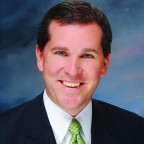
For several weeks, the broadcast airwaves were peppered with public service announcements from three of our local mayors touting “some good economic news for a change.” Each PSA ended with the line “It’s better here.” Unfortunately, not too long after they began to air, the national economy crashed, causing ripple effects in the Peoria area. Companies by the dozen were forced to make painful cuts to survive, which is never good economic news. But I was very disappointed by some of the comments and political lampooning endured by our elected leaders for doing what they should do in a time of crisis: lead.
Their point, if you actually listen to the entire script and not just the tag line, was to highlight why our local economy is stronger and poised to weather and rebound from this economic storm better than many others. Never did the mayors say, “It’s perfect here,” or “Job cuts will never happen here.” Their intentions were pure, and their message accentuated the positive—something rarely done in the news media.
Too often, we are so bombarded by depressing economic news that it’s easy to think the sky is falling and things will never get better. So the mayors of Peoria, East Peoria and Pekin got together in a terrific spirit of regional cooperation and teamwork to assure their fellow citizens that, indeed, the sky is not falling. And what did they get for doing exactly what they should be doing as elected leaders? In some cases, ridicule.
Now, it’s easy to understand why some people weren’t enthralled with the message. Some have lost their jobs, others are worried they’re going to be laid off—it’s not a time for economic celebration for anyone. But again, in times of crisis, we look to the leaders in our lives—parents, teachers, clergy, elected officials, experts, anyone who can provide comfort and reassurance. That’s exactly what this message did, and it wasn’t just lip service or patronizing. They relied upon proven statistics and facts from valid and reputable sources. Jamie Markley, radio co-host of the Markley and Luciano Show on WMBD-AM, said it best: “It’s like if several people around you are telling you it’s a great day, but one of your family members just died. It may not be a great day for you, but overall it is a pretty good day. And even for you, it will get better, but right now (it) is pretty painful.”
What does this have to do with tourism? Rooted in much of the commentary from pundits appeared to be a lack of civic pride. Many of the remarks were a slap at the community, as well as the message. So what does it say to strangers who are thinking about visiting our towns and research the Internet, only to find articles, columns and blogs that trash this area’s reputation? Does that sound inviting to you? In this technological age, word of mouth can spread around the world in nanoseconds, thanks to email, blogs and the like. Therefore, if we’re not proud of our community, we will be lousy at convincing others why we’re a better choice to visit or host an event than other destinations. iBi

